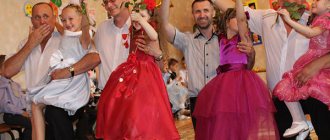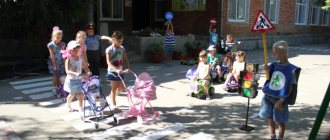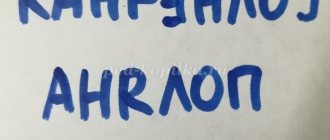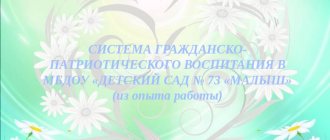Outline of the parent meeting in the senior group topic: “Speech development of the child”
Parent meeting outline
in the senior group "Fidgets"
topic:
“Child’s speech development”
Topic:
"Child's speech development"
Target:
— Creating conditions for the speech development of preschool children in the family;
— Improving the pedagogical culture of parents.
Tasks:
— Introduce parents to different types of games and game tasks for the development of children’s speech;
— To promote the acquisition of practical skills in their use at home.
Forms of implementation: Workshop using game training.
Participants: Teacher, parents.
Equipment for the event: felt-tip pens, recording of calm music, handkerchiefs (according to the number of participants), ball, ball of thread.
Event plan:
- Introductory part.
- Game training “Developing a child’s speech.”
- Final part.
- Miscellaneous
Preparatory work:
- Making invitations to meetings for parents;
- Prepare proverbs about language
- Organize an exhibition of literature on children's speech development.
- Prepare instructions for parents “Little tricks”, “How to read to children”.
Progress of the event.
- Introductory part.
Teacher: good evening, dear parents! We are very glad to see you at our meeting dedicated to the problem of speech development in preschoolers.
Games help both children and adults feel comfortable and confident and relieve anxiety. To do this, I suggest you play the game “Compliment”. Now we will pass the ball around in a circle. When you pick it up, you will need to introduce yourself: say your name and patronymic and, handing it to your neighbor, tell him a compliment.
The teacher plays the game “Compliment”. Purpose of the game: to establish contact between parents, to form a positive attitude in them.
What do you think speech is?
Speech is a powerful tool for the comprehensive development of a child. The skill of correct speech, like all good skills, is acquired in the family. What a family does to develop a preschooler’s speech is of great importance for his entire subsequent life.
Main goals and objectives
in the program that is used in our kindergarten.
Speech development.
Developing free communication with adults and children, mastering constructive ways and means of interaction with others.
Development of all components of children's oral speech: grammatical structure of speech, coherent speech - dialogic and monologue forms; formation of a dictionary, education of the sound culture of speech.
Practical mastery of speech norms by pupils.
Fiction.
Cultivating interest and love for reading; development of literary speech.
Cultivating the desire and ability to listen to works of art and follow the development of the action.
If we consider children as a whole, then of course everyone has problems with speech development. Children who especially need specialized help take classes with a speech therapist. You can all freely approach teachers for help.
Free, clear, logical, expressive, beautiful oral speech of a child is a goal to which we should strive. Achieving this goal is not easy, and we are concerned that the number of older preschool children with defects in the pronunciation of speech sounds and other qualities, with poorly developed coherent speech, and monotonous speech is growing.
What speech development games can you organize with your child if you are busy in the kitchen while cleaning the apartment?
What can a child do while waiting for an appointment with a doctor, at a hairdresser, etc.?
The problem of speech development in preschool children is acute today. We can only solve it through the cooperation of the family and the kindergarten. I want to offer you a number of ways and techniques that can help solve this problem. Today you will learn why you need to do finger exercises and what word games you can play with your child at home.
2. Game training with parents.
Educator: Dear parents! You are probably well aware of the famous statement by V. A Sukhomlinsky “The mind of a child is at the tips of his fingers.” Scientists have come to the conclusion that the speech and motor centers in the cerebral cortex are located nearby and partially compensate for each other’s functions. In addition, psychologists say that finger exercises develop attention and memory.
What finger games do you know?
I would like to introduce you to the finger gymnastics “Two Centipedes”,
which you can spend with your child at home. These are various movements of the fingers using poetry.
Let's all practice together.
Two centipedes were running along the path.
They ran and ran and met each other.
We met each other and hugged each other tightly.
They hugged each other so tightly that it was difficult to separate them.
Finger games based on poetry develop a sense of rhythm and help children work on their diction.
You can use finger games with objects. Let's play with handkerchiefs. The game is called "Swallow".
Take the handkerchief by the corner and try to gather it into your fist without helping yourself with your other hand. In this case, you can say the following words:
“I have a swallow,
He swallows everything,
So it became swallowed
The belly is like a hippopotamus.”
This game can be complicated: not only perform movements alternately with your right or left hand, but then with both hands at the same time.
As such items for finger games, you can use natural materials (acorns, chestnuts, nuts, etc.), any small toys, mosaics, construction parts, matches without sulfur, and much more. But the main condition is that it must be a game, then the child will be interested. For example, you can play “Cinderella” - separate the peas from the beans and beans, or sort out some cereal. During this game, safety rules must be observed, since small objects can only be played with in the presence of adults.
You can play “builders” - build houses from counting sticks or matches without sulfur. You can play “seamstress” - wind the threads into a ball or wind them on bobbins, you can lay out a picture according to the sample. You can come up with your own games - there is a lot of room for imagination.
Word games are especially effective for developing a child’s speech. They improve conversational speech, enrich vocabulary, and form the grammatical structure of the language. Develop attention, memory, intelligence.
Let's learn some word games that you can play with your child. So, let's begin!
The teacher conducts practical activities with parents to master the techniques of developing children’s coherent speech using exercises:
Exercise 1. Choose epithets and definitions for the word. For example: elephant - ... (big, gray, fat, kind); ball - ... (round, football, leather); cake - ... (sweet, fruity, chocolate, delicious), etc. (Parents' answers).
Exercise 2. Find out from the description. For example: clubfoot, loves honey and raspberries, sleeps in a den. Who is this? Bear; branchy, tall, green, prickly. What is this? Spruce; old, brick, two-story. What is this? House; menacing, big, with a shaggy mane. Who is this? A lion.
Exercise 3. “What if...” Invite them to dream: “And if I had a magic carpet...”, “And if I had walking boots...”, “And if I had a time machine...”, “And if I had a hat- invisible..."
Exercise 4. “Name it in your own way.” Give a new name to a poem, fairy tale, cartoon. For example: what can you call the fairy tale “Little Red Riding Hood”? (“Adventures of a little girl”, “On the way to grandma”, “How to tell a grandma from a wolf”, etc.).
Exercise 5. “Other characters.” Tell a fairy tale by changing the roles of the characters. For example, the Russian folk tale “The Three Bears”: the girl is evil, Mikhail Ivanovich; Nastasya Petrovna; Mishenka - kind.
Exercise 6. Come up with a continuation of the fairy tale. For example, what do you think happened after the fox ate Kolobok?
What articulation exercises do you know?
Articulation gymnastics
is a set of special exercises aimed at strengthening the muscles of the articulatory apparatus (speech organs), developing strength, mobility and differentiation of movements of the organs involved in the speech process.
- Sharp, abrupt pronunciation of sounds: a-a-a; uh-uh; ae-ae-ae.
- Chewing movements.
- Movements of the lower jaw left and right.
- Cheek exercises.
- "Tube". Pull your lips forward, keeping your jaws closed.
- "Horse". Smile, click your tongue loudly and energetically. The lower jaw is motionless, only the tongue moves.
Presentation of an exhibition of visual material, a series of story-based pictures on the development of coherent speech in preschoolers. Review of pedagogical literature on the topic of the meeting, acquaintance with “helper” manuals that promote the development of a child’s coherent speech.
4. Final part.
Educator: In conclusion, I would like to offer you the game “The Connecting Thread.” Let's stand in a circle, I will give you this ball, and you will pass it to each other and say what you learned from today's topic, is this problem important for you and your children, what games do you remember, what games do you play? want to play with your child.
(Participants pass a ball of thread in a circle. Everyone who has already passed the ball holds on to the thread. When the ball returns to the leader, the participants pull the thread).
Educator: This symbolic thread connected and united us today. I thank you for your cooperation, for your sincerity and goodwill.
For that. To make your home games with your child as effective and interesting as possible, I give you these reminders - booklets.
Summary of the meeting:
– Dear parents, it is up to you, to a greater extent, how your child will grow up. The kindergarten and we, the teachers, can only help you with advice and recommendations. But you need to remember that your real actions, your behavior have the greatest influence on the formation of the child’s personality. Try to be an example for your children.
Miscellaneous:
- Presentation of certificates for participation and victory in the crafts competition
“The Mouse is in a hurry to visit us”
- Report of the chairman of the parent committee.
Memo for parents
“Little tricks” for developing coherent speech in preschoolers.”
- Engage with your child every day. The duration of classes is from 20 (children under 6 years old) to 3 minutes (children over 6 years old) per day.
- Do not try to speed up the child's natural development.
- When communicating with your child, watch your speech. Talk to him slowly, and when reading, do not forget about expressiveness. Explain to your child unclear words that appear in the text.
- Encourage your child, praise him more often, rejoice in his successes,
- encourage him if something doesn't work out.
- Pay attention to and eliminate the child’s speech deficiencies. If a child is in a hurry to express his thoughts or speaks quietly, remind him: he must speak clearly, clearly and slowly.
- Never leave your child's questions unanswered
"How to Read to Children"
- Before listening to a work of art, it is necessary to remove from the child’s field of vision all interesting toys, entertaining household items - everything that can prevent the child from listening to a story or fairy tale.
- The literary text must be selected in accordance with the age and individual abilities of the child.
- Acquaintance with a literary work occurs by ear, so adults should pay special attention to the ability to read expressively, place logical emphasis in the right places, and observe pauses.
- Show your child colorful illustrations that will help him understand the text better. In preschool age, everything is taken almost literally, which means when choosing a book, pay attention to ensuring that the illustrations are as realistic as possible
- While reading a work, it is advisable not to be distracted by extraneous matters. Remember that children are able to actively and productively engage in one activity for about 15 minutes. Find these 15 minutes for your child.
- Be sure to ask your child questions about what you read.
- Instill in your child from childhood a love of books and a caring attitude towards them.
Articulation gymnastics
is a set of special exercises aimed at strengthening the muscles of the articulatory apparatus, developing strength, mobility and differentiation of movements of the organs involved in the speech process.
Exercises for the muscles of the soft palate and pharynx.
- Yawning.
- Swallowing droplets of water, saliva. You can put sweet water into a pipette and drop it onto your child’s soft palate, stimulating swallowing.
- Gargling.
- Sharp, abrupt pronunciation of sounds: a-a-a; uh-uh; ae-ae-ae.
- Coughing.
- In the most difficult cases, it is useful to use mechanical stimuli to activate the soft palate - metal spatulas, paper tubes, wooden sticks.
Exercises for the lower jaw.
- Opening and opening the mouth. Moreover, both freely and with resistance to the hands of an adult.
- Chewing movements.
- Movements of the lower jaw left and right.
- Cheek exercises.
- Inflating the cheeks: both simultaneously and alternately.
- Distillation of water from one cheek to another.
- Retraction of the cheeks into the oral cavity between the teeth.
Lip exercises.
- Smile without exposing your teeth.
- “Fence”, smile so that the upper and lower teeth are visible.
- “Cub”, perform the “fence” exercise and open your mouth at a distance of 2-3 cm. In this case, the upper and lower teeth are visible.
- "Tube". Pull your lips forward, keeping your jaws closed.
- "Window". Make a “tube” and open your mouth slightly.
- “We hide our lips.” Pull your lips towards your teeth.
- Lip vibration (horse snorting).
- "Trumpeter". From the “tube” position - move the lips left and right.
- Smacking.
- Holding pencils, glass tubes, buttons, beans with lips.
- Spitting out seeds, rice, peas with lips.
Exercises to strengthen the tip of the tongue, relax the root of the tongue, stretch the hyoid fold (“frenulum”).
- "Spatula". The wide tongue rests calmly on the lower lip.
- "Watch." Retracting the tip of the tongue to the corners of the mouth to the right and left. The lower jaw is motionless.
- Biting the tongue with teeth over its entire surface, gradually sticking the tongue out and retracting it again.
- "Swing". The mouth is wide open, the tongue moves up and down, behind the upper teeth - behind the lower teeth.
- A sluggish, calm tongue is pushed between the lips, the mouth is slightly open, but not wide. The child says: five-five-five.
- Spitting rice, peas, seeds from the tip of the tongue.
- Licking drops of sweet water with the tip of the tongue from the concave surface of spoons.
- "Comb". Scratching the tongue on the upper teeth.
- Counting the teeth, resting the tip of the tongue on each one.
- Turning cubes of bread crusts and walnuts over in your mouth.
- "Delicious jam." Licking jam from the upper and lower lips alternately. Circular licking of lips.
- Licking plates with the entire surface of the tongue.
- "Needle." Narrowing and sharpening of the tongue - we stretch our tongue towards the mirror.
- "Horse". Smile, click your tongue loudly and energetically. The lower jaw is motionless, only the tongue moves.
- "Turkey poults." Smile, open your mouth, raise your tongue to your upper lip and curl it up. Move your tongue back and forth along your upper lip, saying: blah blah blah.
- "Slide". Smile, open your mouth, rest the tip of your tongue on your lower teeth, your tongue should not stick out forward.
- "Painter". Smile, open your mouth, lift your tongue up and move the tip of your tongue back and forth across the palate.
- "Woodpecker". Smile, open your mouth, lift your tongue up. With the tip of your tongue, forcefully touch the tubercles behind your upper teeth, saying “d-d-d.”
Senior group. Senior preschool age. Children 5-6 years old
Scenario of the educational event “Road Literacy” for children and parents of older groups (5–6 years old)
The purpose of the event: to form the basis of safe behavior on the street in children and
parents . Objectives: To clarify and consolidate knowledge about the rules of behavior for pedestrians. To consolidate the knowledge of children and adults about road signs, the purpose of traffic lights, and their signals. Develop thinking and memory.
Publication “Event scenario for children and parents of the senior group “Maslenitsa. » MUNICIPAL STATE PRE-SCHOOL EDUCATIONAL INSTITUTION "KINDERGARTEN No. 17" LEVOKUMSKY MUNICIPAL DISTRICT OF STAVROPOL TERRITORY Joint event for children and parents of the senior group "Let's celebrate Maslenitsa" Developed by teacher Golotsutskaya S.I. With. Pravokumskoe.
Scenario of the event for children and parents “New Year’s gatherings” in the senior group
Scenario of the event for children and parents “New Year's gatherings” Purpose: Creating conditions for the development of cognitive interests and communication skills through literary play. Strengthen children's knowledge about the holiday. Objectives: • Enrich and activate children's vocabulary on the topic.
Scenario of a sports festival according to traffic rules with the participation of parents in the second senior group “Journey to the country of road signs” Conducting relay races and competitions, selection of musical accompaniment: Mokienko E.V. Presenter: Bobrovskaya E.V. Traffic police inspector: Murygina T.A. Participants: educators, children of the senior group, physical director and parents Goal: To strengthen children’s skills in using traffic rules.
Scenario of a sports festival for children and parents “Fun Fun” for older preschoolers Sports festival for children and their parents “Funny Fun” Competitions are held with the aim of: • strengthening the health of children, improving physical development, and developing a healthy lifestyle in preschool children; • popularization of physical education and sports; • improvement.
Scenario of the environmental holiday “Take care of nature” for children and parents of the senior group Ecological holiday “Take care of nature” for children and parents of the senior group Holiday for children and parents of the senior group “Take care of nature” Goal: To promote the formation of the foundations of environmental culture in children, to cultivate a caring attitude towards nature based on specific.
Summary of speech therapy leisure “Our family KVN” in senior and preparatory groups with the participation of parents The purpose of speech therapy leisure: Consolidating the knowledge of children acquired during training in speech therapy classes and involving parents in the correctional process. Corrective educational objectives: To acquaint parents with the methods and techniques of corrective education for children;
"Cabbage gatherings." Scenario of autumn entertainment for children and parents of the senior group “Cabbage Gatherings”. Autumn entertainment for children and parents of the senior group Alieva U.Shch. "Cabbage gatherings." Autumn entertainment for children and parents of the older group Cabbage gatherings Ved.: Hello, dear, welcome and long-awaited guests! Everyone for the autumn gatherings.
Source
Long-term plan for interaction with parents of the senior group
Anna Solina
Long-term plan for interaction with parents of the senior group
[for the 2019–2020 academic year
b] Long-term plan for interaction with parents of the senior group for the 2019-2020 academic year.
Goal: To create in kindergarten the necessary conditions for the development of responsible relationships with the families of pupils, ensuring the holistic development of the preschooler’s personality, and to increase the competence of parents in the field of education.




